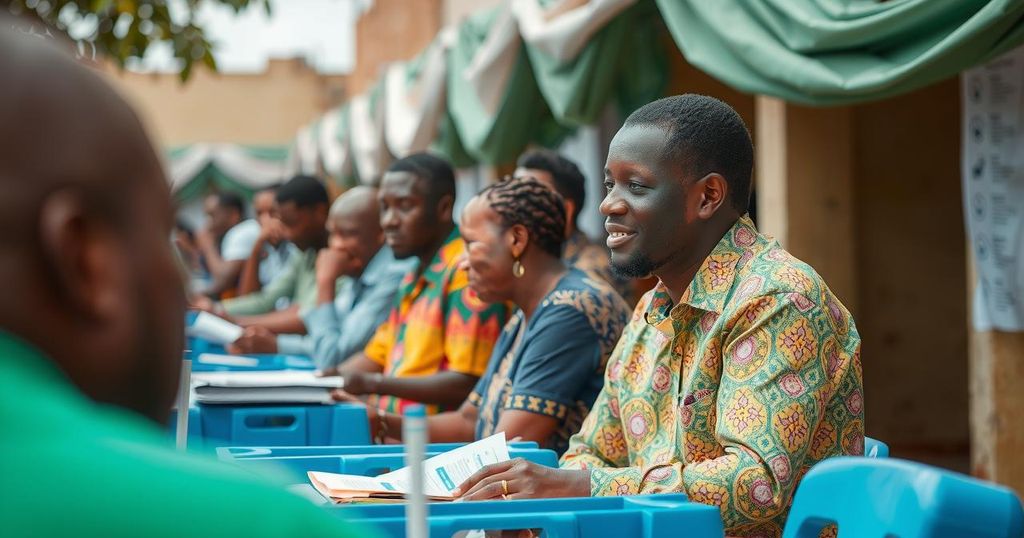Ghana Elections: A Test of Democracy Amid Economic Turmoil

Ghana opens polls for presidential and legislative elections amid severe economic challenges, with 18.7 million voters eligible. Two main candidates, Mahamudu Bawumia of the NPP and John Dramani Mahama of the NDC, are vying for leadership during a time marked by heightened inflation and dissatisfaction among citizens. Analysts suggest limited policy differences between the candidates even as they appeal for votes. The election outcome is crucial for addressing the nation’s pressing economic crises.
On Saturday, polling stations across Ghana opened for presidential and legislative elections amid a backdrop of significant economic hardship. Approximately 18.7 million voters are eligible to participate in this critical election, which is seen as a critical measure of the nation’s democratic health, particularly in a region that has recently faced extremist violence and political upheaval. Ghana, once heralded as a symbol of democratic stability in West Africa, is now grappling with an economic crisis characterized by soaring inflation and rising unemployment.
Historically recognized as a model of democratic governance, Ghana has experienced a marked decline in economic conditions over the past few years, causing public sentiment to shift dramatically. Recent findings from Afrobarometer indicate that a staggering 82% of citizens believe the country is on the wrong path. Despite a total of 12 candidates contesting for the presidency, the race has been predominantly framed as a contest between two main candidates: the ruling New Patriotic Party’s (NPP) Vice President Mahamudu Bawumia and former President John Dramani Mahama of the National Democratic Congress (NDC).
The ruling NPP has been criticized for its handling of the ongoing economic crisis, while Mr. Mahama, ousted from office in 2016 for failing to fulfill economic promises, remains a prominent figure in opposition. On the ideological spectrum, the NDC is regarded as a social democratic party, whereas the NPP positions itself as center-right. However, analysts suggest minimal substantive differences between their proposed policies.
In addition to the presidential race, elections will also determine 276 members of parliament, with the NPP and NDC currently holding 137 seats each in the 275-member legislature, and one independent member who typically aligns with the ruling party. Their final campaign rallies saw both candidates touting their platforms as means to alleviate economic woes. Mr. Bawumia pledged continuity and stability from the outgoing administration, while Mr. Mahama called for a comprehensive “reset” of the nation’s governance and economy.
Despite a festive atmosphere across Accra, underscored by political rallies, songs, and high-spirited support, the overarching concern remains the severe economic crisis. After defaulting on much of its foreign debt last year, inflation soared, reaching 54%, severely impacting the costs of food, fuel, and essential commodities. Additionally, illegal gold mining, a pressing concern, exacerbates environmental degradation and highlights the economic desperation faced by many citizens, further complicating the political landscape leading into these elections.
In Ghana, a nation historically recognized for its commitment to democratic values, the upcoming elections will serve as a critical examination of the country’s political and socio-economic environment. The nation faces unprecedented challenges due to an economic crisis that has significantly affected the livelihoods of its citizens. Increased inflation and unemployment have escalated discontent among the populace, complicating the electoral landscape. As voters head to the polls, the two leading candidates from the ruling and opposing parties present themselves as alternatives to each other, albeit with little distinction in their proposed policies. The elections represent not only a choice of leadership but also a chance to address broader economic implications.
The elections in Ghana stand at a pivotal juncture, reflecting the intertwined fates of democratic principles and economic reality. As citizens cast their votes for the next president and parliament members, they face a complex dilemma characterized by historical allegiance to democracy and the immediate urgency of economic hardship. With the daunting challenges of inflation, unemployment, and illegal mining at the forefront, the outcome of the elections will decisively shape Ghana’s future trajectory, both democratically and economically.
Original Source: www.voanews.com






